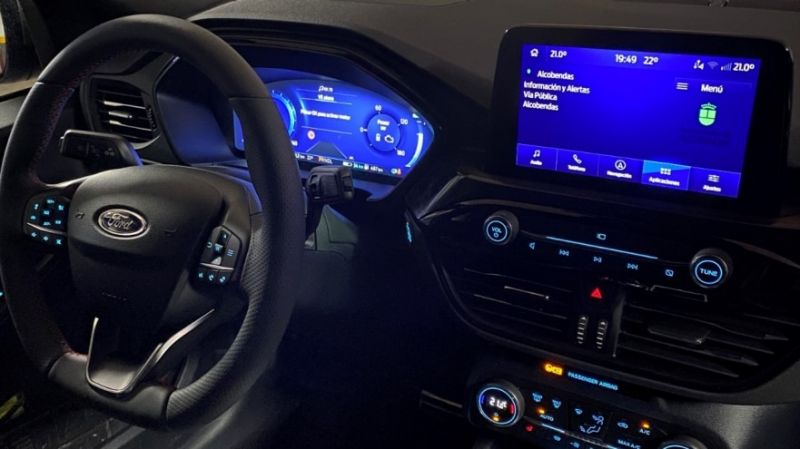German Court Puts a Sales and Production Ban on Ford's Internet Connected Cars in the Country Due to Patent Dispute
【Summary】A German court has put a nationwide sales ban on Ford Motor Co vehicles in the country that have internet-connected infotainment systems. The move is as part of a lawsuit over the violation of wireless technology patents, Reuters reported on Friday. The ruling by the Munich regional court is primarily over the licensing of standard-essential patents for LTE networks used in Ford vehicles in Europe.

A German court has put a nationwide sales ban on Ford Motor Co vehicles in the country that have internet-connected infotainment systems. The move is as part of a lawsuit over the violation of wireless technology patents, Reuters reported on Friday.
The ruling by the Munich regional court is primarily over the licensing of standard-essential patents for LTE networks used in Ford vehicles in Germany.
However the verdict by the Munich regional court is not legally binding and can still be appealed, it said. According to Reuters, the ruling requires a 227 million euro ($240 million) security payment by the plaintiff, Japan's IP Bridge Inc in order for it to become "provisionally enforceable".
IP Bridge Inc assists companies in collecting patent fees from automakers and other firms for the use of their intellectual property.
These communications technologies are used in vehicle navigation systems, vehicle communications as well as autonomous vehicles sending and receiving vehicle data over-the-air.
"Reason of this court case is the licensing of standard-essential patents for LTE networks. Since we did not yet receive the written opinion of the court, we do not want to comment on this matter at this time," Ford said in an emailed statement to Reuters.
Ford's connected cars of the future will come packed with 5G and LTE-based communications technology to power everything from autonomous driving, navigation, digital payments and other connected services. In many cases, the hardware that supports these vehicle communications systems is supplied by leading telecommunications companies such as Qualcomm, Verizon, Nokia and others, which were typically operating outside of the auto industry.
But as automakers introduce connected vehicle technology in the models, entering partnerships with technology partners that supply the hardware and communication protocols will be vital.
The ruling against Ford in Germany court follows a similar case in February in Japan by 48 telecommunications technology developers, including Finland's Nokia, U.S. chipmaker Qualcomm and Japan's NTT.
The group of telecommunications companies demanded that Japanese automakers Toyota, Honda and Nissan pay them patent fees for components used to connect cars and their vehicles to the internet.
The 48 companies hold roughly 70% of the standard patents that form the core components of 4G communications technology. They are considered to be basic patents indispensable to the development of internet connected vehicle infotainment systems.
Nokia for example, is strong in communication infrastructure such as base stations, while Qualcomm holds many key semiconductor-related patents.
For the automakers in Japan, U.S. company Avanci, which is in charge of negotiating patent fees for the LTE (4G) communication standard, are asking the three major Japanese carmakers to pay $15 per vehicle in exchange for comprehensive use of related patents held by companies such as Qualcomm and Nokia.
The automakers will be charged regardless, even if drivers never use any of the communications technology.
A similar suit involving the alleged infringement on patents covering in-vehicle communications technologies was brought against Toyota, Honda and General Motors in Oct 2021.
Bellevue, Washington-based private equity company Intellectual Ventures Management LLC filed lawsuits with federal district courts in Texas against Toyota, Honda and General Motors over the use of in-vehicle Wi-Fi networks.
As more vehicles are being built that can connect to the internet, licensing communications technology and paying patent fees to telecommunications companies are likely to be commonplace in the auto industry.
In Feb 2021, Ford named Google Cloud its preferred cloud provider to leverage Google's world-class expertise in data, artificial intelligence (AI), and machine learning (ML). As part of the six-year partnership that begins in 2023, millions of future Ford and Lincoln vehicles will be powered by Android, with Google apps and services built-in.
-

Two Ford Crown Victorias Still Operating as Taxis in NYC
-

Mazda CEO's Opinion on EV Adoption in the U.S.
-

Hyundai's revolutionary powertrain design
-

Sustainability focus urged by Michelin Fleet Panel
-

BM Catalysts' UK Expansion
-

Warwick University's £12m funding for electric vehicle battery progress
-

Executive X Series: Unveiling the Powerful City/Vios Competitor
-

Hollywood couple defies expectations, showing affection after 20 years
- GM Expanding First Responder Training Program for EV Crashes
- EV Startup Fisker Inc. Hires BMW Exec as Senior VP of Manufacturing, Aims to Build One Million EVs a Year by 2027
- Volvo’s Electric Vehicle Brand Polestar Reports $1 Billion in Revenue in the First Half of 2022, Adds 6 New Global Markets
- Qualcomm Ventures Invests in ThunderX, a Company Developing a Domain Controller-based Intelligent Vehicle Compute Platform
- China’s CATL to Supply Honda with 123 GWh of Electric Vehicle Batteries by 2030
- Volkswagen’s Software Unit CARIAD Selects Innoviz as its Direct Lidar Supplier for the Automaker's Future Software-Defined Vehicles
- GM CEO Mary Barra Shares the First Look at the New Chevy Blazer EV Launching in Spring 2023
- Lucid Group Hires Key Executives that Formerly Worked for Mercedes-Benz and Tesla as it Prepares for Global Expansion and Production Ramp Up
- Honda's New EV Friendly Retail Plans Hint at the End of Mega Dealerships
- BMW Expands i4 Lineup With the Affordable eDrive35



















 About Us
About Us Contact Us
Contact Us Careers
Careers